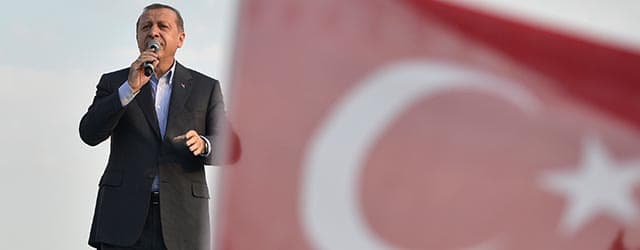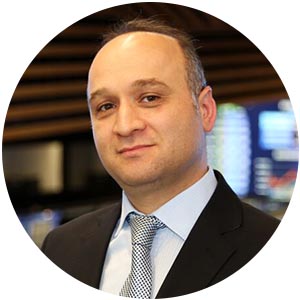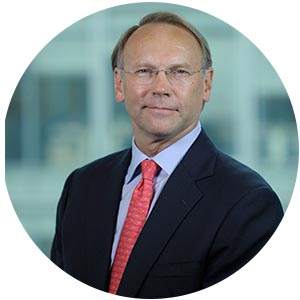Elections over, Turkey firms up plans to become a financial hub.

Throughout a long and controversial career, Turkish president Recep Tayyip Erdoan has never lacked ambition.
On November 1, he surprised just about everyone by securing a new parliamentary majority for his Justice and Development Party (AKP) in the second parliamentary election this year. Despite critics who predicted the days of AKP supremacy were past, the party won nearly 50% of the vote—or 316 seats in the 550-seat parliament.
It was a dramatically improved showing from the June 7 elections, when AKP lost its majority for the first time in 13 years. The Turkish lira and stock market rallied, as investors breathed a sign of relief that the instability that might have followed another inconclusive result had been averted. Major bank stocks such as Akbank saw their share prices jump as much as 10%.
Now the hope is that Erdoan (and his AKP prime minister, Ahmet Davutolu), done campaigning, will show equal determination in pushing ahead with Vision 2023, a list of goals that Erdoan wants Turkey to meet by then to commemorate the centenary of the Republic of Turkey’s foundation out of the ashes of the Ottoman Empire.
Much international attention has focused on Vision 2023’s ambitious $350 billion megaproject infrastructure and energy plans, many of which are already being implemented in the form of new roads, bridges, metro systems, railways and power stations. However, the underlying motivation is Erdoan’s determination to make Turkey one of the world’s top 10 economies, with a world-class financial center by 2023. stanbul currently holds 47th place in the Global Financial Centers Index (GFCI); its leaders want to see the city vault into the top 10.
BUILDING A BASE

Post-election signs have been encouraging. Finance minister Mehmet imek said the November election result provides “a great opportunity for us to carry out reforms.” imek—previously employed by Merrill Lynch—added that the government would boost capital markets and change tax legislation to encourage equity financing rather than debt financing. The idea is to make stanbul’s financial sector top-notch—and a major regional player.
Turkey laid the groundwork for such a tranformation early in the millennium. When its financial sector almost collapsed in the wake of the 2001–2002 market crash, far-reaching reforms were introduced to stabilize and strengthen banks. Thanks to tight regulation, enhanced powers granted to the Banking Regulation and Supervision Agency and the Capital Markets Board, and guaranteed independence for the central bank, Turkey’s banks escaped the 2008–2009 global crisis and Turkey’s own downturn in 2011–2012 largely unscathed.
Another major step forward came in 2013 with the Capital Markets Law (CML), which inaugurated a new financial era by establishing rules for the operation of investment funds, insurance companies and other financial funds and vehicles. Crucially, it created Borsa stanbul, which put all the financial exchanges in stanbul—including the stock exchange, derivatives exchange and gold exchange—under one roof.
“The CML requires regulatory licenses for investment services, which will help cultivate a specialized workforce for asset management and investment advisory,” says Hüseyin Özkaya, CEO of Turkey’s Odeabank. “Many recent reforms, including improvements in corporate governance standards, pension funds reform, have bolstered stanbul’s financial market credibility.”
Another critical step came in January 2015 with the opening of the stanbul Arbitration Center to oversee and settle disputes.
TRIBUTE TO DUBAI
At the physical heart of stanbul’s plans is the construction of the stanbul Financial Center, a vast 2.5 million-square-meter complex on the city’s Asian side that will house state-owned banks, the financial regulator and insurance houses, hotels, restaurants and apartments. Due to open in 2018, the IFC is clearly modeled on the Dubai International Financial Centre. It will cost an estimated $5 billion, around half of which has already been invested. Once the center is completed, the government expects it to generate an amount equal to 4% of GDP.
“IFC is not just about moving financial institutions to a single location,” says Tuncay Dinç, CEO of Borsa stanbul. “It is about strengthening the capabilities of the whole Turkish market to enable stanbul to take its place among the most advanced financial centers.” He adds that his institution will not relocate to the center.
In many ways, though, stanbul’s ambitions run deeper even than Dubai’s. The aim is not just to create a center of the same size or scope as London, New York or Singapore, but to occupy the role formerly held by Beirut as the financial hub of the Levant region—and to give Dubai a run for its money by attracting large-scale international banks and developing business in such areas as Islamic finance. stanbul already ranks second on the GFCI index of Central and East European financial centers, just behind Warsaw. The plan is to focus on where it is really strong—transnational business—and to use this strength to move forward.
Many recent reforms, including improvements in corporate gover- nance standards, pension funds reform, have bolstered Istanbul’s financial market credibility.
~ Huseyin Ozkaya, Odeabank
“The authorities have a good understanding of what is involved in competing against other exchanges and have been very strategic in how they have gone about building up Borsa stanbul and the financial sector generally,” says Noel Edison, the European Bank for Reconstruction and Development’s (EBRD’s) director for insurance and financial services, pointing to Borsa stanbul’s prioritization of modern technology and close interfacing with other global exchanges. He says the momentum has been noticeable since the introduction of the new Capital Markets Law in 2012, driven in part by ambition to compete with other exchanges but also by a broader shift within the economy to reduce foreign exchange risk by borrowing more in local currency.
TRADING SURGE
The EBRD has been closely involved with Borsa stanbul’s growth and evolution and has agreed to take a 10% stake in the entity ahead of its planned IPO next year. The timing of the operation will depend on market conditions, but Dinç says the IPO—which follows Borsa stanbul’s strategic partnership with Nasdaq OMX—will make it “a more efficient institution applying best corporate governance practices.”
Borsa stanbul has been busy establishing closer links with other exchanges and now holds stakes in four regional ones (Kyrgyz Stock Exchange, Baku Stock Exchange, Sarajevo Stock Exchange and Montenegro Stock Exchange). More associations are planned.
Borsa stanbul “aims to be the region’s technology and finance hub,” says Dinç. “We have established relations with exchanges around the world, including MoUs [memorandums of understanding] with exchanges in the Balkans, Central Asia and the MENA [Middle East and North Africa] region.” He says joint product and technology development programs, connectivity projects, exchanges of personnel and educational initiatives are all major areas of focus for the exchange.
It is a mark of success that Borsa stanbul was able to evolve and grow during a roller-coaster year for Turkey with two elections, doubts about the domestic economy, and regional geopolitical concerns. For the first nine months of 2015, traded values in derivatives, fixed income and equity markets were up by 32%, 27% and 22%, respectively, year-on-year. And although IPO activity slowed, as it did in other emerging markets, corporate debt issuance was strong.
SOLID BANKS

One reason for this performance is Turkey’s strong banking sector, which has consistently provided a firm backbone to its financial sector’s ambitions.
“[Turkish] banks are better-capitalized than most of their emerging markets peers, as evidenced by capital adequacy ratios that are around 15%,” says nan Demir, chief economist and head of the CEO office at Finansbank in stanbul. “This would suggest that Turkish banks are well positioned to compete globally.” He warns, however, that Turkey’s low savings ratio has imposed liquidity constraints. “With a loan-to-deposit ratio of around 120%, Turkish banks would need to attract large amounts of foreign financing to expand their balance sheets significantly, which is clearly very challenging in the current global environment.”
After a difficult year, the outcome of recent elections should prove positive for the banks, whose continued health remains the key to Turkey’s broader plans for the financial sector.
The sharp drop in the lira against both the euro and dollar this year (before the elections on November 1, Turkey’s currency was one of the world’s worst-performing, dropping almost 28% against the dollar) led Fitch to warn of risks to asset quality and capitalization. However, most Turkish lenders retain investment-grade ratings, and Fitch says the AKP’s clear victory means that “political stability should boost confidence and support growth, which will benefit the outlook for banks.”
Turkey’s financial-center plans will also require economic and political stability and a predictable environment in which investors and banks can plan ahead. Although much has been done to modernize the legal environment governing financial markets in Turkey, officials will also have to reaffirm central bank independence to allay concerns that it might be subject to political interference.
And stanbul still has its work cut out to become a major hub for Islamic finance. Although sukuk trading started in 2013 and is doing well, London and Kuala Lumpur are well ahead. Recent attempts by Halkbank to open Turkey’s fifth Islamic bank had to be suspended for legal reasons. For Islamic banking to really take off, there has to be a developed investor base for it. But Turkey’s main financial aims lie elsewhere.
“Given the potential of Turkey’s economy and its linkages with dollar and euro markets, as well as its links to emerging markets, I would expect traditional equity and debt financing to dominate here,” says Edison.
“stanbul as a financial market has already come a long way,” he adds. “The stage is set for a successful outcome.”
TURKEY: A FINANCIAL SNAPSHOT |
|||
|---|---|---|---|
2012 |
2013 |
2014 |
|
|
Market value of |
$315,198 million |
$195,746 million |
$219,763 million |
|
Value of cross-border M&A by country of purchaser |
$2,012 million |
$590 million |
$398 million |
|
Real GDP Growth |
2.1% |
4.1% |
2.9%* |
|
Inflation |
8.9% |
7.5% |
8.9% |
|
Public Debt (general government gross debt as a % of GDP) |
36.2% |
36.1% |
33.7% |
|
FDI Inflows |
$9,601 million |
$ 10,488 million |
$10,066 million |
|
*Estimate |
|||



